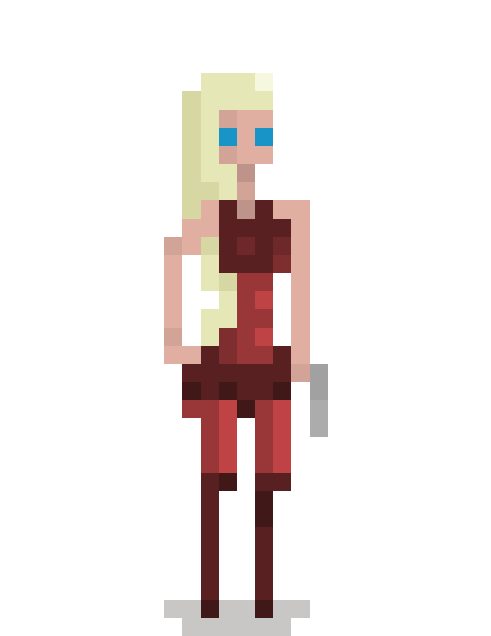You've done it. You created the game you've always been dreaming of and now you want the world to play it. Here there is the possibility of great reward, be it a pot of gold, widespread recognition, or peace of mind knowing the fun others are having.
Publishing your own game starts with setting goals. How many people do you want to reach?
### Making Money
Is one of your goals to make money with your game?

If you *don't* care about making money, then you're free to develop whatever kind of game you want. You can publish however you like and generally take a happy-go-lucky attitude towards the process.
If this is your first video game, I recommend taking the care-free route. It can be liberating to do whatever the heck you want without a second thought. Most developers start to make money when they have multiple games under their belt anyway.
If you *do* care about making money then you're going to need to decide on a monetization strategy. There's several options you can go with:
* **Paid**: Make money upfront, when the player downloads your game. With this strategy, you guarantee a certain amount of income per player. Also, it's easier to chart on today's app stores because more and more games are free. On the other hand, you'll have a significantly lower quantity of players (albeit likely higher quality).
* **Freemium**: Make money by selling In-App Purchases (IAPs). The upside is that because the game is free, you'll likely get around ten times the downloads compared to being paid. The downside is that because a large percentage of games these days are free, it can be difficult to make the charts.
* **Paymium**: This is the paid model, except that you also sell IAPs. More and more games are going with this strategy because you guarantee an income per player, being paid creates a sense of value in the players mind, and you can create a long term income from selling IAPs day to day.
* **Ad-Supported**: Make money by displaying advertisements in the game. This one depends on your style of game. Some games can get away with displaying advertisements. Others games it doesn't feel right. Another point is that you make only a few cents per ad displayed (even the full-screen ones), so you're going to need a lot of daily players to make an income by displaying advertisements.
### Setting Expectations
If you're out to make some cash, it can be easy to get stars in your eyes when you realize the top games these days are pulling in millions per day. While fundamentally, it *is* possible for *any*one to create this kind of success, indulging in high hopes can lead to bitterness if the great expectations are not met.
On the other hand, if you set expectations too low, you'll probably never create any success at all.
It is vital to set proper expectations.
I like to think of expectations like throwing a baseball. There are two dimensions to consider:
1. Y Axis: The height the ball reaches. Synonymous with **expectation**.
2. X Axis: The distance the ball covers along the ground. Synonymous with **actual success**.

If you're an idealist like me, you might have the tendency to set extremely high expectations. If you expect too much, you'll be like the baseball player who throws the ball straight into the air. The ball will rise to the greatest height, but it will fall back to the same position, gaining no distance at all. Expecting too much from any kind of venture in life can backfire, possibly leading to disastrous results.
You might be a realist or pessimist. In this case, you'll have the tendency to set extremely low expectations. When you expect too little, you're like the baseball player who instead of throwing the ball, decides to roll it along the ground. Friction takes over and the ball hardly goes anywhere, leading to very little distance covered. Expecting too little from anything is like this. You won't accomplish much.
It's a physical fact that throwing a baseball at somewhat of an angle (say around 30 degrees) leads to greater distance covered than if the ball were thrown parallel to the ground. Gravity affects the ball regardless. The ball thrown along the ground falls and stops quickly because of gravity. The ball thrown at an angle first rises, then falls, giving it more time to cover a greater distance.
The moral of the story here is not to think too big nor too small, but just right. As this is entirely relative, it's up to you to know yourself, your tendencies, and to set proper goals.
Okay, enough on goals and expectations. On to the fun stuff: polish.
### Polish
When finishing your game, you want to play it a lot, watch friends play and polish it to a near-perfect shine. Since most game developers these days release half-assed games, polish can help you to be distinct.

Invest that extra bit of time into watching your friends play the game and refining the controls to be easier and more fun. Watching a friend play can be one of the most enlightening events in your game-making history. Be sure to be silent. Let your friend bumble. Resist the urge to help them. Then refine.
As your game begins to shine, ask new and different friends to play. Imagine that you have never played your game, start from the beginning, and take notes on what aspects of your game need more “fun” attention. Then go crazy with those improvements.
Stand apart from the crowd of low-quality games that bloat the app store like aged protein bars at the dollar store. Be a fresh and tasty protein bar. Yeah.
Remember:
1. Polish your game to a [juicy][1] shine, and
2. Develop a worthy marketing habit.
### The Marketing Loop
Marketing and publicity are in essence just the business of communicating with people. Here's a list of ways you can market and publicize your game:
* Call, text, email and involve your friends
* Create a website for your game
* Post to your social networks
* Write a blog post for your own site or a guest post on someone else's
* Email gaming bloggers and send them a little gift, be it a free copy of your game, some in-game credit or a t-shirt
* Submit your game to directories (we'll publish your game in our [game directory][2])
* Submit your game for design / gaming awards
* Create videos of your hottest gameplay and post them
* Ask people to review your game
* Post on gaming forums, mentioning your game if allowed, else use a signature with a link to your game's website
* Create a meetup to play your game in person
* Attend gaming-related conferences
* Advertise
Got a suggestion for this list? Please share in the comments below.
### Discovery
It's important to realize the current state of affairs in regards to the app stores. There are literally thousands of new games released *every* day. Supply is high. Demand is low. How does a game get discovered?

If you don't have thousands of dollars to spend on advertising, then you've got to focus on DIY marketing. Make it a habit to **communicate** about your game on every work day. Make your communication more and more effective. Constantly seek new ways to get your game discovered and experiment often. Be scientific when possible, but remember that marketing is as much an art as it is a science.
Where appropriate, take a look at what the mass of games are doing and consider the opposite.
You don't necessarily have to focus on the app stores. You could start with a Mac, Windows or Linux version. When most developers are focused on mobile, this can be a shortcut to distinction.
Release your game on as many platforms as you can. This is where Cocos2D-X comes to the rescue. With your game on multiple platforms, it makes it that much easier to get discovered.
If you are going to focus on the app stores, do read up on [App Store Optimization (ASO)][3] and optimize your icon, title, keywords, screenshots and description.
### Launch Day
A great deal of importance is placed on launch day. Developers assume that if a game doesn't get a huge spike at the start then it is doomed to failure.
I propose that this paradigm is unhelpful and largely invalid.
It takes time to develop traffic. Does it really matter whether that traffic comes on launch day or over the course of a year?

Do focus on long-term growth. Don't focus on the spike (or lack thereof) at the start.
If you're aiming for Apple, Google, or Amazon to feature your game, then launch day *is* important. However, for most indie game developers, the reality is that because of the sheer number of apps approved daily, it is unlikely that you'll be featured. Don't expect it. Do [prepare][4] for it if you think you've got a shot.
Focus on the long tail. Don't try to squeeze everything you can out of launch. Focus on the long term success of steady downloads, continual growth, and developing a name / brand before you ever expect to be featured.
### Stay Creative
Continually update, refine and extend your game, as you see fit. It is a living creation, as long as you are its lifeblood.
That's all.
[1]: //indiegames.com/2012/05/juice_it_or_lose_it_-_a_talk_b.html
[2]: /publish-game/
[3]: //en.wikipedia.org/wiki/App_store_optimization
[4]: //john.do/featured/











